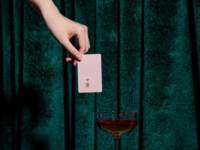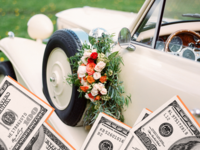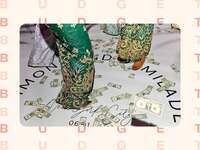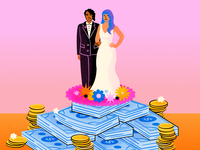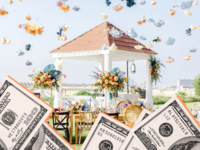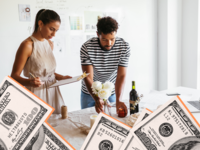Will Newly Imposed Tariffs Impact the Wedding Industry?

If you've opened your phone in early 2025, you've likely observed the chatter around President Trump's newly imposed tariffs. Well, The Knot is now entering the chat because President Trump's tariff impacts are already influencing weddings. To get a clear picture of what engaged couples need to know as they plan a wedding amid President Trump's current tariff policy, we spoke with wedding pros and financial experts who were able to give us a read into budgeting and more.
Tariff Impact on Weddings at a Glance:
Here's the TL:DR on the new tariffs on imports and how they're affecting the wedding industry.
- President Donald Trump enacted tariffs on many imported goods from Canada and Mexico at a rate of 25%. Most imported goods from China face a tariff rate over 100%. And a universal tariff of 10% applies to most goods from other global trading partners.
- Certain wedding vendors, especially bar services, floral design, rentals, and fashion, are starting to experience the impact of President Trump's tariffs.
- Wedding pros are thinking creatively and proactively to support couples amid ongoing tariff volatility.
In this story:
- Current State of Weddings and Tariffs
- What Trump's Tariffs May Do to the Wedding Industry
- How to Combat the Effect of President Trump's Tariffs on Weddings
Current State of Weddings and Tariffs
What tariffs did the administration put forth? Do small businesses worry about Trump's tariff plans? Before we can more fully understand the impact of these tariffs, it's worth getting a lay of the land and breaking down what tariffs are and how they affect global supply chains.
What Are Tariffs?
In short, a tariff is a tax levied on imported goods. This definition of tariffs may leave you wondering about how tariffs impact the economy. As the Library of Congress explains: "Tariffs are typically used selectively to protect certain domestic industries, advance foreign policy goals, or as negotiating leverage in trade negotiations." While tariffs have been used at various times in our country's history, they are a focal topic of current political discourse because of new tariff plans put forth by the current administration.
Understanding the Global Wedding Supply Chain
According to The Knot 2025 Real Weddings Study, couples hire an average of 14 vendors to bring their wedding day to life. But have you ever considered what suppliers those pros rely on to power their business? And whether those suppliers will be affected by the tariffs from President Trump?

Taylor Whitten, a content strategist at The Knot, married in Baltimore, Maryland, in January 2025. She hosted a mostly DIY wedding with only 24 guests. Even with her smaller-than-average size wedding, the event still relied on at least six countries as part of the supply chain. Whitten's gown was made in China, some of her rentals were made in Germany, her wine was from France, her A/V system was manufactured in Mexico and all her flowers came from across South America. While Whitten's small-scale wedding relied heavily on the global supply chain, bigger weddings lean on global supply networks even more broadly.
What Trump's Tariffs May Do to the Wedding Industry
Now to the question you've been waiting for: Will President Trump's tariffs raise prices of wedding-related goods? "Across the industry, vendors who rely on imported materials are facing cost increases," explains Jennifer Bernal, Creative Director of House of Bernal. Specifically, Gretchen Culver, owner of Rocket Science Events adds: "These are companies that offer a tangible product that comes from overseas, and they don't have the ability to pivot to different suppliers."
Tariffs to be aware of, as of April 15, 2025:
- Mexico and Canada: The United States is part of a trilateral trade agreement with Canada and Mexico known as USMCA. For goods not covered by that agreement, there is a 25% duty on imports. This is pursuant to a memo published by The White House on February 1, 2025, "President Donald J. Trump is implementing a 25% additional tariff on imports from Canada and Mexico."
- China: Tariff rates between the US and China continue to change rapidly. The volatile tariff rate fluxuated from 54% to 145% for most goods in the first half of April.
-
Other Global Trading Partners: On April 2, 2025, President Trump signed Executive Order 14257 which enacted two new tariff policies that affect most countries that trade with the US. The first measure is a 10% universal tariff. The second measure was a reciprocal tariff policy that has been put on pause for 90 days for all countries except China.
With the broad uncertainty around the future of President Trump's tariffs, it's also hard to predict exactly how the wedding industry will be impacted by tariffs. Courtney Alev, a consumer financial advocate at Credit Karma, emphasized that many consumers are feeling whiplash from the rapidly evolving tariff situation, making forecasting for the future a tenuous task. "If we continue to see tariffs go into effect, we may see wedding vendors and planners experience price hikes on certain imported items, whether it be alcohol, catering supplies, furniture rentals, or wedding attire like bridesmaid dresses and tuxedos. As a result, we'll likely see some of those costs passed on to nearlyweds."
What Is the Goal of the Tariffs?
Christina Greenberg, owner of Urban Set Bride in Virginia, notes that the goal of tariffs, generally, is "to encourage people to buy American." However, in the case of the wedding industry, she points out that the issue isn't necessarily a simple (or quick) switch. Most American-made wedding goods are "cost-prohibitive for one-time use or not available in the quantity needed to sustain a booming wedding industry," says Greenberg. "[Bridal fashion is] something many people don't think about, but we don't have the materials (beading, lace, boning, tulle, silks), the skilled labor force, or the infrastructure to handle [dress production] in this country." With this in mind, let's take both a short-term and long-term view at the effects of tariffs.
Who Covers the Cost of Tariffs?
Who pays tariffs on imports? In short, it depends. "Vendors with high-cost goods, such as flowers, are grappling with how to handle the potential financial impact of tariffs," notes New York-based wedding florist Ahna Han. Han, a former The Knot Ones to Watch honoree, shared that many of the wholesale flower suppliers she knows of are doing their best to absorb the cost hikes. While doing this saves couples from having to pay, it cuts into profit margins and "it's unrealistic for them to take on the entire burden."
Han's contracts include a provision addressing potential cost increases, something we may start to see even more. She goes on to explain that it's also unrealistic for pros, themselves, to cover the entire cost. "As a vendor, it's a tough situation because it's not realistic for small businesses like us to absorb the rising costs and still stay profitable. At the same time, it's unfair to expect consumers to cover the price increases if tariffs lead to higher costs."
Despite the tough situation, Han shares that it isn't all doom and gloom. "I believe there are creative solutions, such as sourcing lower-cost alternatives to stay within budget, but both parties need to be willing to put in the extra effort by doing research and being open to alternatives."
Which wedding categories are being affected by tariffs? Alcohol | Gowns and Fabric | Flowers | Rentals and Decor | Electronics and Equipment | Paper | Transportation | Catering and Cake
Wedding Alcohol Tariffs
Alcohol tariffs are one area where many nearlyweds may start to feel the effects of the Trump Administration's 2025 tariffs. Brandy Boulette, the VP of Operations at The Treasury Venue Collection, a company that owns multiple wedding venues in Florida, noted that couples' wedding margaritas may start to cost more. The simple why? Well, tequila and mezcal are sourced from Mexico. Similarly, many bar companies also import liquor, like Crown Royal and Canadian Club, from Canada which could further affect wedding bar prices. Beyond North America, major wine and alcohol exporters, especially those in Europe, have been affected by the implementation of the 10% universal tariff. Couples eager to enjoy a champagne toast or trendy champagne tower at their reception now might re-evaluate their plans.
Wedding Gown and Fabric Tariffs
Have you ever wondered how common wedding dresses made in the USA really are? Greenberg says 80% of the gowns sold in the US today are made in China, and even those that are assembled in the US still typically import fabrics and embellishments from abroad. As Justin Warshaw, the CEO and Creative Director of the Justin Alexander Group, explains: "For raw materials or products produced in China, there is an additional 20% [tariff on the cost of the good]."
Warshaw shared that while his company is waiting to see what will happen with President Trump's tariffs, they are looking into moving products to different countries for production. While the "entire industry is working hard to adjust and maintain value for couples," as Warshaw notes, it's important to remember that change also takes time, and there may be some price volatility in the interim. For example, Greenberg's boutique chose to add a fee to cover tariff costs to their gown contracts. She explains that they decided to do this to help couples see the effects of the tariffs and how they're "punishing small-business owners and consumers." Additionally, some retailers are already debuting updated pricing—notably, online wedding attire company Azazie announced that their updated tariff-informed pricing will take effect April 16th. Ultimately, Warshaw remains optimistic: "While there is current uncertainty, this will not last forever. It is possible things get worse before they get better, but they will certainly get better."
Wedding Flower Tariffs
Han explained that she's been counseled by financial advisors to raise her prices by 10% across the board. Han also notes that the full impact of President Trump's tariffs, especially in regard to wedding flower prices, haven't yet been felt. "I expect that once wedding season begins, tariffs will lead to price hikes and shortages," says Han. Han is proactively discussing the situation with couples during the booking process.
Han's contract with couples includes a provision addressing potential cost increases, a clause that attorney Leah Weinberg of Weinberg Legal advises all to-be-weds be on the lookout for. "Couples should definitely expect to see a provision in their florist's contract that protects the florist if the price of flowers rises between the time of booking and the wedding. Especially since someone might book a florist a year or more out, it makes sense that a florist is going to want to cover themselves if the cost of goods goes up significantly so that they aren't losing money."
If there are potential price changes, both Weinberg and Han note that it shouldn't happen in a vacuum. Rather, a collaboration between the vendor and couple should take place. "Couples want to make sure that that provision requires the florist to have a conversation with them before automatically making substitutions," advises Weinberg. This is the very type of clause that Han has: "This clause empowers clients to either maintain their original agreed-upon budget or select the upgraded, higher-priced option. I believe in giving clients control over their choices."
Despite Han's proactive work to address "questions from planners and clients about pricing uncertainties and how I plan to handle potential increases" she is experiencing longer-than-usual booking times. "Now, more than ever, potential clients are hesitant about their initial investment and taking longer to make informed budgeting decisions, which has led to longer lead times for bookings. Some are opting for lower-cost alternatives by simplifying design requests or postponing non-essential elements which has led to a decrease in revenue."
And while couples will be subject to rising flower costs via the clauses discussed above, Jennifer Bernal points out that booking promptly can still save you in other areas, specifically with non-perishable decor. "Couples should book as soon as possible to allow their floral designers to purchase hard goods (like vases) early at current pricing," she says.
Wedding Rental and Decor Tariffs
Morgan Montgomery, co-owner of Paisley & Jade, a rentals company based in Virginia, emphasized that beyond costs, the tariffs are also adding another layer of stress to small-business owners. She shared that ordering furniture from overseas is already stressful with sourcing vendors and navigating shipping times, and the uncertainty around tariffs has unfortunately added another layer atop that. For Montgomery's company, their approach to the tariffs is that they are not increasing prices for clients with booked contracts, "but we will be letting clients know as they inquire about items that need to be imported that we will be very communicative about the pricing and tariff impact."
Wedding Electronics and Equipment Tariffs
Wondering how tariffs will affect electronics? Courtney Lohnes, the Director of Social Event Sales at the Regent Santa Monica Beach in California, explains that imported audio-visual equipment may be affected by tariffs. She says this could "lead to higher costs for venues that provide these services, impacting the pricing of packages for couples. Tariffs may cause disruptions in supply chains, leading to delays in shipments of wedding items from abroad."
Wedding Paper Tariffs
Tariffs on paper are another area to be aware of given the prevalence of stationery in weddings, from invitations to day-of signage. You may not realize this, but many US-based stationers import their paper (or even the wood pulp that gets manufactured into paper) from abroad.
Wedding Transportation Tariffs
The automobile industry is one of the most commonly discussed businesses when it comes to tariffs. Not only does the US import many cars, even US automakers import parts which means that fully-American made cars don't presently exist. Thankfully, transportation companies don't need to buy new vehicles for each wedding they handle so the effects of automobile tariffs might not affect couples as rapidly as other areas. However, if the cost for repairs on vehicles remain high due to tariffs, there is a chance this could affect couples.
Wedding Catering and Cake Tariffs
Are you wondering what foods will be affected by the tariffs? According to the FDA, approximately 15% of the food supply in the US is imported from abroad. Thankfully, under USMCA, a free-trade agreement between the US, Mexico and Canada, many agriculture items that the US imports from Canada and Mexico are protected. Ultimately, couples' menu selection will impact where food is coming from and, therefore, how much their food and catering prices will be affected by tariffs.
How to Combat the Effect of President Trump's Tariffs on Weddings
So, what does all of this mean for engaged couples? First, have honest conversations with wedding pros, both those you've booked and those you're considering, about your wedding budget and how the average cost of a wedding may look different in light of current events. Additionally, read and discuss contracts with your vendors to understand any fees or price-change clauses that may be part of their business agreement. Booking vendors early can be a great way to lock in pricing as it stands now. Lastly, work buffer money (around 10–15% of your total budget) into your plans to be prepared for unexpected additional costs.
Have Honest and Tough Conversations With Vendors
"Don't hesitate to ask tough questions about how tariffs might affect your budget—the answers will help you determine if a vendor is the right fit," urges Han. "A trustworthy vendor will be open and transparent about their approach to managing cost implications. It's important to have someone who advocates for both your design vision and budget, ensuring they align and influence each other effectively. And in the same turn, it is essential to remain open to collaboration as we navigate the uncertainty because clear communication is key to providing options for making well-informed decisions." And if you're worried about making things work and need to ask for help paying for the wedding, consider asking if wedding vendor payment plans are something your pros are willing to consider.
Read Contracts Thoroughly
"Understand your contract before signing, ask your vendor questions on anything you don't understand," says Culver. Even if you've already booked vendors, this advice still holds true: "Go and read your contracts again, to see if there is any language around price increases," advises Culver. "If there isn't, and the vendor hasn't brought it up, they may plan on eating the costs of the tariffs. I strongly encourage all couples to have empathy and an open conversation with their vendors about price increases."
Add Contingency Funds to Your Budget
Jacqueline Vizcaino, owner of Tinted Events Design and Planning in Atlanta says that "couples should establish a contingency fund by saving 10–15% of their overall budget to cover unexpected price hikes. Budget overruns become more probable when supply costs experience volatility. Couples who fail to introduce flexibility into their budget should plan to face difficult financial decisions as their wedding date approaches." Megan Grose, a Colorado-based event planner who owns Brindle & Oak, encourages couples to consider as much as 20% for their buffer number, if possible. "We find this has helped with the unexpected bump in bills due to tariffs but it creates very little wiggle room for upgrades and other unexpected costs during wedding planning," she says. (Pro tip: There are some unique ways you can make extra wedding money if you're on the hunt for a profitable side-hustle to help as you navigate how to pay for the wedding.)
Be Flexible and Patient
Lorie Lau, a California-based wedding planner with H+L Lovely Creations, says that everyone, pros and couples alike, need to learn to adapt. Adapting to this fluid situation could look like adjusting your wedding budget, swapping in alternative decor elements, or even scaling back on some wedding ideas. "Having an open mind will be important as we move through this policy change. Understanding what's at hand and trusting your vendor's expertise will be [instrumental] to your wedding and design," she says.
Book Promptly
"Don't hesitate on booking your vendors," advises Culver. "If you have a date and it is not changing, book your vendor now as it may give you some advantages down the line when it comes to pricing and dealing with any unexpected economic issues. Your life will be easier with your first choice of vendors secured no matter what the future holds." As you're entering into contracts, make sure you understand when vendor payments are due so you can plan accordingly.
Hire Local Vendors
"Find vendors who value sourcing local," says Grose. "Where does the caterer procure their cheese? What flower farms does the florist order from? Sourcing local can not only be price effective but sustainable and great for the environment and the community you are marrying in."
Please note: The Knot and the materials and information it contains are not intended to, and do not constitute, legal, financial or tax advice and should not be used as such. You should always consult with your professional advisors about your specific circumstances. This information contained herein is not necessarily exhaustive, complete, accurate or up to date. In addition, we do not take responsibility for information contained in any external links, over which we have no control.

